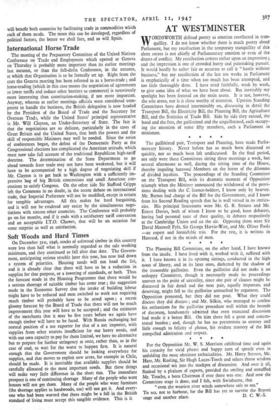International Horse Trade
The meeting of the Preparatory Committee of the United Nations Conference on Trade and Employment which opened at Geneva on Thursday is probably more important than its earlier meetings last autumn, or than the full-driss Conference, in the autumn, at which that Organisation is to be formally set up. Right from the start the Geneva meeting has been referred to as a horse-trade ; and horse-trading (which in this case means the negotiation of agreements to lower tariffs and reduce other barriers to commerce) is notoriously more interesting than constitution-making, if not more important. Anyway, whereas at earlier meetings officials were considered com- petent to handle the business, the British delegation is now headed by the President of the Board of Trade and the Secretary for Overseas Trade, while the United States' principal representative is Mr. Will Clayton, an Under-Secretary of State. The fact is that the negotiations are so delicate, particularly in the cases of Great Britain and the United States, that both the powers and the skill of responsible Ministers may well be needed. Since the series of conferences began, the defeat of the Democratic Party at the Congressional elections has complicated the American attitude, which must now take full account of the traditional Republican high-tariff doctrine. The determination of the State Department to go ahead towards freer trade may not have been weakened, but it will have to be accompanied by a high degree of negotiating skill if Mr. Clayton is to get back to Washington with a sufficiently im- pressive bag of big British concessions and small American con- cessions to satisfy Congress. On the other side Sir Stafford Cripps left the Commons in no doubt, in the recent debate on international trade, that Imperial Preference will not be modified, except in return for tangible advantages. All this makes for hard bargaining, and it will not be rendered any easier by the simultaneous nego- tiations with sixteen other countries. The Conference will probably go on for months, and if it ends with a satisfactory tariff convention and an acceptable I.T.O. Chanter, that will be an occasion for some surprise as well as satisfaction.


































 Previous page
Previous page